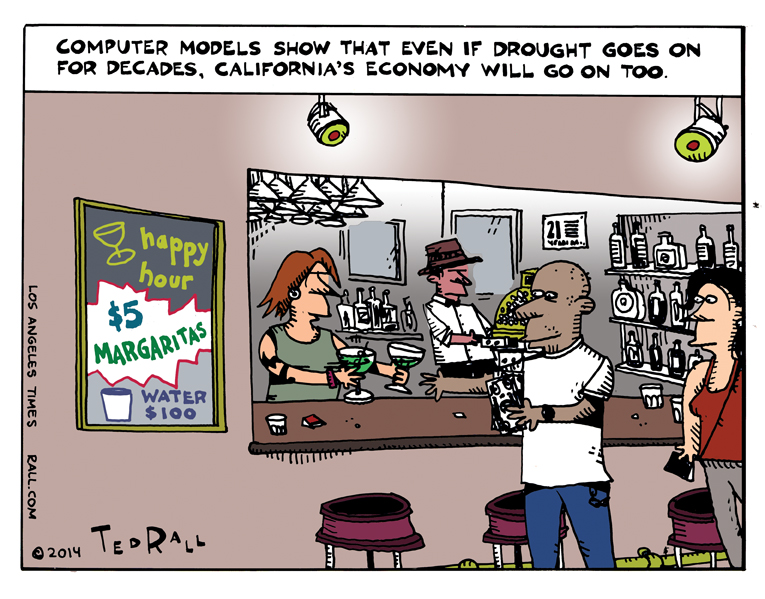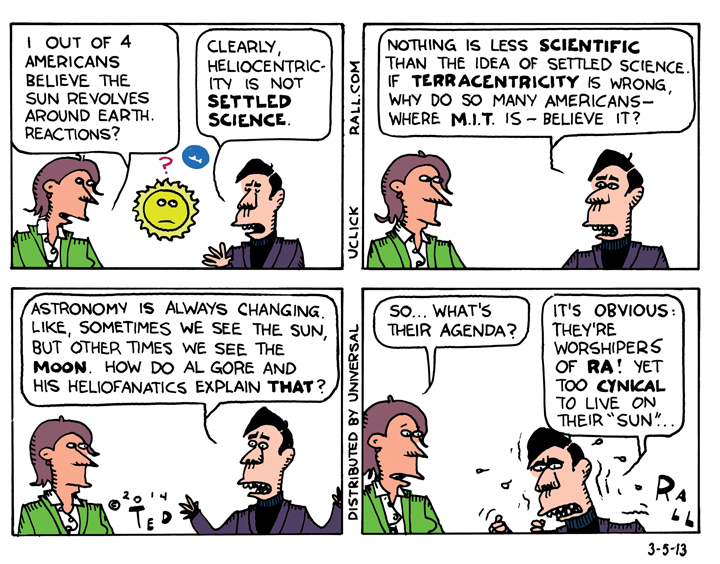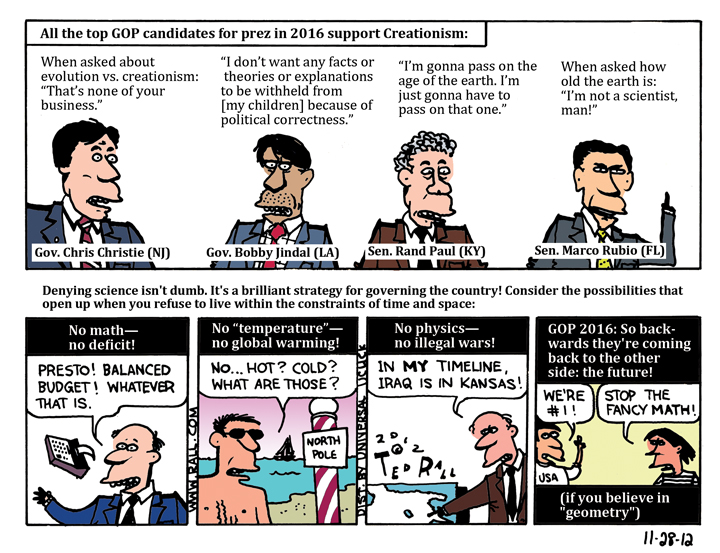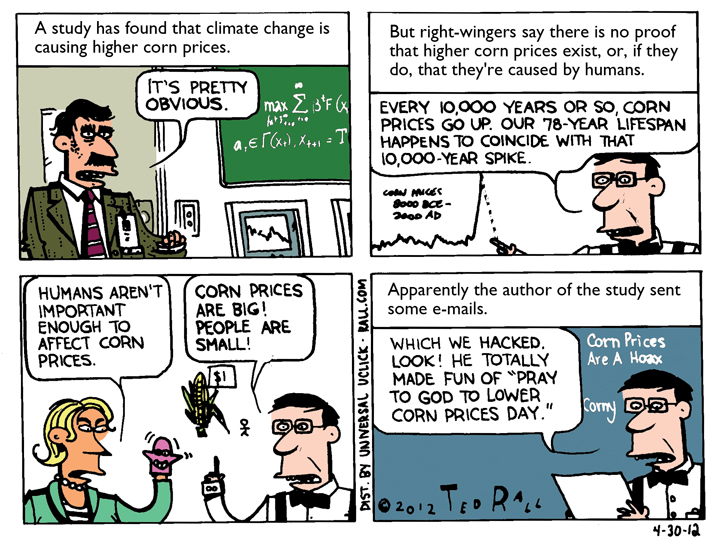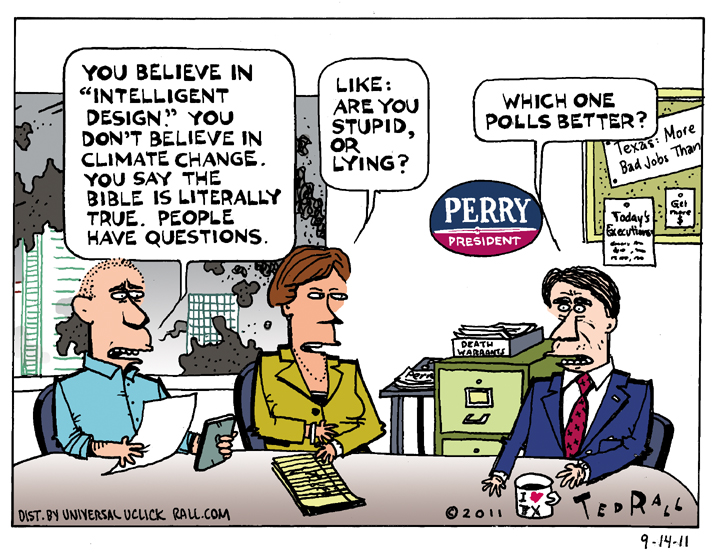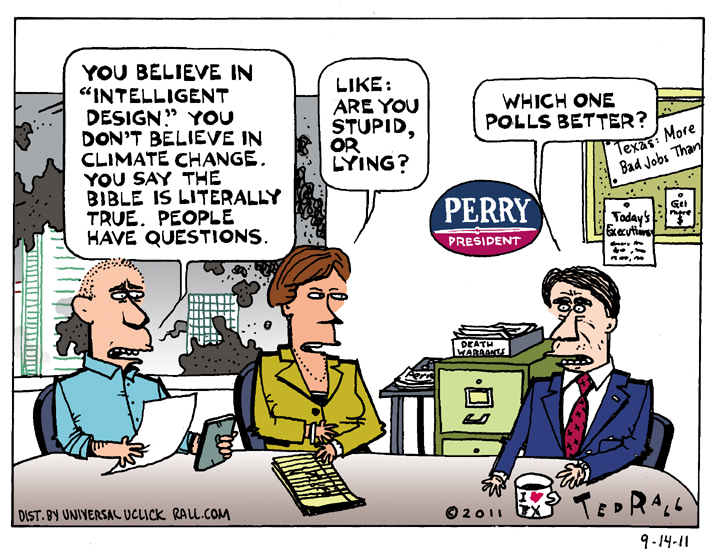Since Americans don’t seem to care much about climate change, President Obama is trying to recast global warming as a threat to the one thing they DO care about: national security.
LOS ANGELES TIMES CARTOON: Drought Goes On, California Goes On Too
Some “deep green” environmentalists believe that the tab for two-plus centuries of industrialization is about to come due in the form of a catastrophic ecological disaster — one that might lead to the great sixth mass extinction on a scale similar to the meteor believed to have taken out the dinosaurs. (Yes, that means you, human reader.)
Here in California, the current drought — which some scientists believe may be the worst in 500 years — understandably leaves many Golden State residents, always aware of water restrictions in a region surrounded by deserts, with a sense of disquiet. What if this goes on? Will the California Dream turn to dust and blow away?
Apparently not. Like the Earth in general, California’s climate is surprisingly resilient, according to recent computer models.
State climate researchers ran a projection of what would happen after “even decades of unrelenting mega-drought similar to those that dried out the state in past millennia,” reports Bettina Boxall of the Times.
“The results were surprising,” Jay Lund of UC Davis told her.
If you own stock in the ag business, you might want to consider unloading them. Agriculture, the climatologists found, would be hit hard. “In their computer simulation, annual runoff into rivers and reservoirs amounted to only about half the historical average. Most reservoirs never filled. Under that scenario, experts say, irrigated farm acreage would plunge…The state’s 8 million acres of irrigated cropland could fall by as much as half, predicted Daniel Sumner, director of the University of California Agricultural Issues Center. Farmers would largely abandon relatively low-value crops such as cotton and alfalfa and use their reduced water supplies to keep growing the most profitable fruits, nuts and vegetables. They would let fields revert to scrub or dry-farm them with wheat and other crops that predominated before California’s massive federal irrigation project transformed the face of the Central Valley in the mid-20th century.”
Biodiversity would suffer too. “Aquatic ecosystems would suffer, with some struggling salmon runs fading out of existence.”
Water prices will rise. Desalination plants will be built along the coast. While initially painful, the agrishock would only affect 4% of the state’s economy — notable, but not fatal.
Bottom line: “The California economy would not collapse. The state would not shrivel into a giant, abandoned dust bowl. Agriculture would shrink but by no means disappear.”
Paradoxically, this good news (or not-that-bad news, anyway) is bad news.
Political and economic leaders tend to ignore problems before they turn into a crisis — especially when heading off the issue would cost money. The news that California’s drought probably won’t lead to ruin within their lifetimes, or our children’s lifetimes, ensures that they’ll keep ignoring environmental destruction. Species will keep going extinct. Flocks of birds will continue to thin out. Invasive species will accelerate the process. These things may not sink the Dow Jones Industrial Average, but they really really really suck.
This is one of those rare times when I wish — almost — that the scientists had lied about what they discovered.
SYNDICATED COLUMN: Smart Young People Who Snub Politics Are Smart

Smart Young People Reject Public Service — Because They’re Smart.
America’s best and brightest don’t go into politics.
(By which we mean mainstream two-party corporate politics. Democrats, Republicans, Washington. Politics as activism, as the ongoing debate over how we should live our lives, remains of great interest to young people.)
Mediocrity among the members of the political class is often cited as a reason for government’s ineptitude, its inability/unwillingness to address the great problems we face today: climate change, soaring income inequality, the Third Worldification of America. If we had smarter, more charismatic politicians, the reasoning goes, we’d get smarter, more effective problem-solving.
Forget it. The word from the trenches of academia is that that’s not going to change. Millennials just aren’t interested.
A national survey of 4200 high school and college students conducted last year found that only 11% might consider running for political office. Most young people say they want nothing to do with a career in government.
We don’t know how that number compares to the past. As Fareed Zakaria points out, “Americans have always been suspicious of government. Talented young people don’t dream of becoming great bureaucrats.”
Still, like other mainstream media types, Zakaria thinks disinterest in public service has increased. “The New Deal and World War II might have changed that for a while, but over the past 30 years, anti-government attitudes have risen substantially,” he says.
Young people think politicians can’t/don’t make much of a positive impact in people’s lives. In a poll of 18- to 29-year-olds, Harvard’s Institute of Politics found a 5% increase, to a third, in the portion of young adults who believe that “political involvement rarely has any tangible results.” When asked about the statement “politics today are no longer able to meet the challenges our country is facing,” 47% agree and 16% disagree.
I was thinking about this a few weeks ago while researching a column about the possible presidential candidacy of Hillary Rodham Clinton in 2016. First lady, senator, secretary of state — Clinton is one of the most successful political figures of our time. Yet what has she actually accomplished? How has she changed the life of the average American? Where is the big feather in her foreign policy cap? She’s been busy, but she hasn’t done anything historical — and the same could be said of almost all her peers.
Future coulda-been bests and brightests are paying attention to Washingtonian disfunction. “How deep is the disengagement?” Ron Fournier asked in The Atlantic. “I spent two days at Harvard, and couldn’t find a single student whose career goal is Washington or elective office. One wouldn’t expect to hear this at the Kennedy School of Government.“
Which prompts two questions:
Why are the young eschewing politics?
Can we do anything to make a career in politics/government more appealing?
Zakaria offers a “why”: “The ever-increasing obstacles — disclosure forms, conflict-of-interest concerns, political vetting — dissuade and knock out good candidates.”
I disagree. Getting exposed for financial or other improprieties is a concern for some political prospects in their 50s or 60s. But the most that your average 21-year-old college senior has to worry about getting outted over is drug use, and if current trends continue, no one is going to care about that in a few years. After all, George W. Bush and President Obama both used cocaine.
Not long ago I was approached by an Important Democratic Party Official about running for Congress. After he saw a talk I gave to a group of high school students, he pronounced himself so impressed that wouldn’t stop calling me. The party needs you, he said. So does your country.
Heady words. And I’m at least as egotistical as the next bear. So I looked into it.
I wasn’t concerned about personal disclosures. I’d be running as far to the left as you can in today’s Democratic Party; my district is very liberal on social issues. Whatever came out wasn’t bound to hurt my prospects. Anyway, I have a theory about political strategy: your opponents can’t use your deeds against you. They can exploit your denial of those deeds. Candidates who reveal their own skeletons find the electorate much more forgiving than when they’re uncovered by their opponent’s “opposition research” team.
Money would have been a major issue. You need at least $1 million to fund a Congressional campaign. It’s easiest if you have it yourself, and if you have rich friends willing to bankroll you. I don’t.
This is a grim system we have. “Wealthy candidates who try to buy office with their own money tend to lose, but in order to set up a campaign, you have to know a lot of wealthy people and wealthy special interests — and that’s something that most of us are not privy to,” Craig Holman, government affairs lobbyist for Public Citizen, told CBS News.
I might have been able to sell out to local business interests in exchange for favor chits to be cashed in later. But then, why run in the first place? For me, the point of running for Congress is to have a chance to change things for the better.
Washington has plenty of you-scratch-my-back-I’ll-scratch-yours corruption as it is. (I’m talking to you, Former Treasury Secretary/Warburg Pincus President Timothy Geithner.) They don’t need more from me.
The money thing is pretty much insurmountable.
Even presupposing a dramatic upturn in my finances (Powerball win? Selling a kidney to a desperate Internet billionaire? Kickstarter?), there’s the question of what I could accomplish in Congress. This is assuming, of course, that I win. Half of candidates lose, with nothing to show for their million-plus bucks.
Like the kids at Harvard, I can’t think of a single Congressman or, for that matter, Senator, who has managed to achieve much for the working class, or the environment, or anything big, since, well — my entire life. And I’m 50. As a political junkie, I would have heard of something.
Senator Ted Kennedy was one of my political heroes. I worked for two of his presidential campaigns. But let’s be honest. What was his greatest political accomplishment? Probably the State Children’s Health Insurance Program. A nice piece of law to be sure, but a small-bore one — and hardly worth spending decades of your life sitting through endless boring meetings.
And that’s what you do in Congress. You sit on your ass waiting for a chance to talk to people who are waiting for you to shut up so they can talk.
To an empty chamber.
Perhaps I should amend this: politics makes sense for right-wingers.
Republicans have radically transformed American society in recent years: legalized torture, extraordinary rendition, Guantánamo concentration camp, preemptive warfare, the doctrine of the unitary executive, sweeping tax cuts for the ultrarich and yes, even Obamacare — that one was dreamed up by the right-wing Heritage Foundation.
Liberals and progressives, on the other hand…there’s not much for us in the world of mainstream politics.
If we want leftie — most young people are — bright young things to enter public service, public service is going to have to change first. Obviously, that doesn’t seem likely. So if you’re a smart, energetic young person who wants to change the world, there’s still a place to do that.
Not in Congress.
In the streets.
(Ted Rall’s website is rall.com. Go there to join the Ted Rall Subscription Service and receive all of Ted’s cartoons and columns by email.)
COPYRIGHT 2013 TED RALL
SYNDICATED COLUMN: Weird Times
In Politics, It’s a Wild Wild Weird World
Hunter S. Thompson said: “When the going gets weird, the weird turn pro.” But what do you do when things go from weird to completely psychedelic?
The political landscape at the beginning of the second term of America’s first biracial president – in the usual historical sense, calling him black kind of requires an asterisk – is a messed up, topsy-turvy, bass-ackwards place.
There is the president’s newfound liberal rhetoric, even going so far as to namecheck gays and lesbians in his Inaugural Address. Did anyone tell him or members of the media that Stonewall was an actual riot, that endorsing this landmark of liberation is to endorse violent revolutionary change? He came off as something as a peacenik, implying that he would be willing to talk to, say, Iran. How does that square with his onslaught of drones, a campaign that increasingly looks like a grim Vietnam-style war of attrition?
But it’s his timing I can’t figure.
Back in 2009, when he came into the White House with an overwhelming mandate for radical change in the midst of the worst economic crisis since the Great Depression, when he enjoyed Democratic control of both houses of Congress, when the Republicans were so whipped that opinion writers for the Wall Street Journal wondered aloud whether there was a future for the GOP, he tacked right. Now that obstructionist Republicans control the House, ordinary citizens have settled into a grouchy state of permanent discontent amid downward mobility and shrinking expectations, when there’s absolutely no reason to expect to get anything big or bold accomplished, the dude is breaking out as some sort of crazy progressive?
Then there’s the bizarre realignment of the two major parties.
Leading Republicans, spooked by the election results, polls that show that the voters of the future are liberal on gays, abortion and other social issues, and possibly from finally having picked up dogeared copies of the prescient tome The Emerging Democratic Majority at Books-a-Million, are freaking out in the weirdest possible way. Something has to be done! But not if it requires compromising on our core values. Um, guys…white guys…old white guys…the problem is that the voters don’t like Republican core values. Or you personally. So what is to be done? Something!
You almost have to feel sorry for Republicans. Sure, they started a bunch of crazy wars that killed hundreds of thousands of innocent people, and they opened a string of concentration camps around the world, and they rolled back 800 years of cherished civil liberties that go back to the Magna Carta. But it’s sad to watch the mighty crash like a dictator’s statue pulled down by invading Marines. Not only is a sorta black man in the White House, all the GOP’s classic election-stealing tricks – corrupting the Supreme Court, bullying recount officials with paid thugs, moving voting booths out of minority neighborhoods – aren’t enough to close the growing gap between their obsolete stances and an increasingly left-leaning electorate. Now they’re so desperate that they’re even flirting with rejiggering the Electoral College, an institution that historically benefits Republicans, in order to suck out two or three more terms with them in control of the House – forget the Senate – before fading away into Whig-like oblivion as the Democrats retaliate.
Not to say that the Democrats are walking the straight and narrow road of sanity.
Americans of all political stripes say there’s one issue that consumes them most. One thing that they think about all the time. Something personal, something that affects everything else. Happily, it’s something that the government not only can do something about, but has been able to address many times in the past. I am talking about, obviously, the economy. Unemployment. Underemployment. The fact that there are no jobs. And that the jobs that are being created are all crappy. Or are in another country. Americans have been remarkably consistent about this. It would be hard to think of another time when people told pollsters for four years in a row that the same issue was the number one issue in the country. Whatever his other challenges, President Obama certainly doesn’t have to wonder about what’s on our minds.
So what is his second-term agenda? Given that his laissez-faire approach to the economic collapse throughout his first term basically involved golfing a lot while hoping that magical market forces would revive on their own, you might think that he would focus in like a laser-guided drone on the economy – you know, the number one most important issue to most Americans – this time around. But no, everyone’s telling us that Obama’s ambitious second-term agenda is – wait for it – gun control, immigration and climate change.
Don’t get me wrong: one of the great tragedies of the last dozen years was that Al Gore, one of the few American politicians who understands the gravity and imminent threat of global warming, didn’t get to exercise the presidential powers he earned at the ballot box. Though I will be shocked! shocked! shocked! if Obama’s proposals rise above the level of the usual too little/too late/too vested in corporate profits to curb industrialization, it’s nice to see the issue get lip service. Restoring sanity to America’s immigration system – can’t get in legally, so sneak in and hide out for 15 or 20 years until the next amnesty – is long overdue. Though, again, I wouldn’t be surprised if we just end up with another Reagan-style amnesty that doesn’t open up the doors to a lot more legal immigrants. Gun control of assault rifles and high-capacity magazines, of course, is just boilerplate post-Sandy Hook elementary school massacre reactionism.
Fortunately, at least one of these issues will probably resolve itself. Already there are fewer illegals trying to sneak into the United States across the border from Mexico because the economy here is so terrible. Who is going to want to come to an impoverished nation full of gun nuts shooting at each other underwater?
Still, it’s disconcerting to watch smug Democrats lord it over clueless Republicans when the only difference between the two parties is one of tone. Republicans let you know that they hate you. Democrats talk nice and then let you down. Neither party gives a damn about the fact that you haven’t gotten a raise in 30 years. How can they? Their contributors are the top executives of the corporations who’ve been lining their pockets at your expense.
One of these days, you’ve got to think that the people are going to notice.
COPYRIGHT 2013 TED RALL
SYNDICATED COLUMN: Lead, or Follow and Get Out of the Race
Voters Turn Against Pols’ Follow-the-Polls Strategy
In order to be a good leader, Disraeli said, “I must follow the people.”
Aided and abetted by toe-sucking pollster Dick Morris, Bill Clinton finessed the art of leading from the rear, relying on Morris’ tracking surveys to help him decide everything from whether to bomb Serbia to when and if to take a vacation.
By definition, however, leaders point where their followers should go. Americans haven’t seen much real leadership on the federal level since Reagan. Where there’s been progress, such as on gay rights, the President only stepped forward after public opinion had shifted enough to make it safe.
For the first time in 30 years, Dick Morris’ follow-the-voters strategy appears to be running out of steam. This year, the electorate seems to be hungering for presidents in the mold of TR, FDR and LBJ—old-school leaders who painted ambitious visions of where America could go and why it should, who took political gambles that the people might not be ready for what they had in mind, who anticipated crises and challenges before anyone else, and explained why we had to act sooner rather than later.
The craving for leadership is evident in the polls. Though personally popular and enjoying the advantages of incumbency, President Obama is running neck and neck against Mitt Romney, an awkward candidate from a minority religion who has trouble connecting with, and is seen as out of touch by, ordinary voters.
Democrats must be worried. Historically, Republican presidential nominees typically gain on Democrats throughout the fall. At this point in the game, Democrats need a substantial lead in order to emerge victorious in November.
What’s going wrong? Mainly, it’s the economy. It sucks. Still. Democrats say the President inherited the meltdown from Bush. But Americans blame Obama.
“The nation’s painfully slow pace of growth is now the primary threat to Mr. Obama’s bid for a second term, and some economists and political allies say the cautious response to the housing crisis was the administration’s most significant mistake,” reports The New York Times. Obama’s big screw-up: “He tried to finesse the cleanup of the housing crash, rejecting unpopular proposals for a broad bailout of homeowners facing foreclosure in favor of a limited aid program—and a bet that a recovering economy would take care of the rest.”
Recovery? What recovery?
The depressed housing market, coupled with the reduced purchasing power of tens of millions of Americans who lost their homes to eviction and/or foreclosure, makes recovery unlikely to impossible for the foreseeable future.
Many people, including yours truly, warned that the millions of Americans who were evicted under foreclosure, many of them illegally, were more “too big to fail” than Citigroup. Some, like former Congressman Jim Marshall (D-GA), voted for TARP, but urged the Obama Administration to condition the bailout on forcing the banks to refinance mortgages and write down principal to reflect the new reality of lower housing prices. “There was another way to deal with this, and that is what I supported: forcing the banks to deal with this. It would have been better for the economy and lots of different neighborhoods and people owning houses in those neighborhoods,” Marshall says.
Voters aren’t mad at Obama for not being clairvoyant. They’re pissed off because he ignored people who were smart and prescient in favor of those who were clueless and self-interested, like Tim Geitner. He may be about to pay a price for that terrible decision.
Tens of millions of Americans already have.
Speaking of leadership—the art of seeing what comes next and doing something about it—what looming problems are the political class ignoring today?
It’s too late to stop the 2008-to-2012 economic meltdown. But it’s still possible for Obama (or, theoretically, Romney) to get ahead of the economy—permanent unemployment benefits, anybody?—and other pressing issues.
Australia, for example, is taking the climate change crisis seriously.
Americans want leaders who point the way forward, to anticipate monsters we can’t yet imagine. For example, there is a huge looming crisis: pensions. In 10 to 15 years, Generation Xers will hit traditional retirement age. How will they eat?
Close to none have traditional defined-benefit pension plans. Gen Xers, who earn far less than the Baby Boomers at the same age, have been shunted into 401(k)s, which turned out to be a total ripoff: the average rate of return between 1999 and 2010 was 0.3 percent.
Total.
And much of that was withdrawn—under penalty—to subsist after layoffs.
“[Gen Xers] have no savings, and what they had was devastated by two market crashes,” said Andrew Eschtruth of the Center for Retirement Research. “They never got off the ground.”
If you’re 45 years old now and just beginning to save for retirement, financial planners say you should save 41 percent of your income annually (if you haven’t gotten laid off again). As if. Half of Gen Xers live hand to mouth; the rest save a piddling six percent a year.
The Gen X retirement crisis represents 46 million people waiting for a savior—and 46 million potential votes.
Attention Mssrs. Obama, Romney and anyone else presenting yourself as a would-be leader: Don’t just read the polls. Don’t follow us. Show that you care about, and have a credible plan to confront, the problems of the future. If you do that—and we’re not holding our breaths—we’ll pay attention to you.
(Ted Rall’s new book is “The Book of Obama: How We Went From Hope and Change to the Age of Revolt.” His website is tedrall.com. This column originally appeared at NBCNews.com’s Lean Forward blog.)
COPYRIGHT 2012 TED RALL


